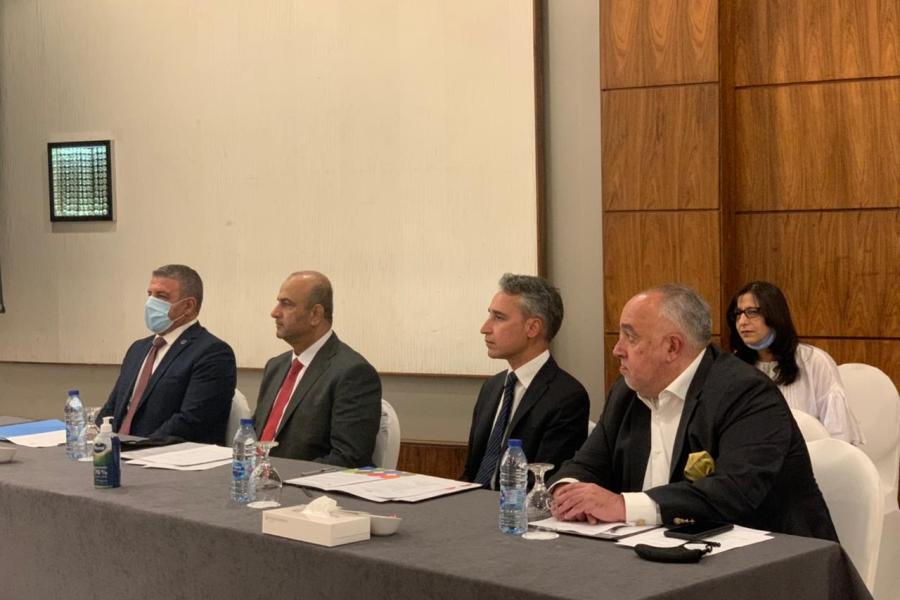Opening remarks by Ziad Sheikh, Acting UN Resident and Humanitarian Coordinator at "The National Food Systems Summit Dialogues"
Remarks as part of the National Food Systems Summit Dialogues in Jordan “Transforming to more efficient and sustainable food systems in light of crises”

Your Excellency Minister of Agriculture, Engineer Khaled Huneifat
Dear guests and friends,
Ladies and gentlemen,
It is a sincere pleasure to join you this morning to the launch of the National Food Systems Summit in Jordan, which concludes a series of sub-national dialogues that took place last months in three of the Kingdom’s regions.
As you know, these dialogues come in preparation for the United Nations Food Systems Summit, which is convened by the Secretary-General in September as part of the Decade of Action to achieve the SDGs by 2030.
This upcoming summit, which represents the results of an 18-month-long consultative process involving global, regional and Independent Dialogues, surveys, and open fora with all actors at every point in food systems, is designed as an opportunity for Member States to identify their own pathways to sustainable food systems and take the necessary action to address their unique challenges.
In his Policy Brief on Food Security launched last year, the UN Secretary-General noted that there is more than enough food in the world to feed our population of 7.8 billion people. But, today, globally more than 820 million people are hungry. And some 144 million children under the age of 5 are stunted — more than 1 in 5 children worldwide. Our food systems are failing, and the COVID-19 pandemic is making things worse.
He also called for immediate actions around three main issues:
- First, we must mobilize to save lives and livelihoods, focusing attention where the risk is most acute. That means designating food and nutrition services as essential, while implementing appropriate protections for food workers.
- Second, we must strengthen social protection systems for nutrition. Countries need to safeguard access to safe, nutritious foods, particularly for young children, pregnant and breastfeeding women, older people and other at-risk groups. And they need to adapt and expand social protection schemes to benefit nutritionally at-risk groups.
- Third, we must invest in the future. We have an opportunity to build a more inclusive and sustainable world. Let us build food systems that better address the needs of food producers and workers. Let us provide more inclusive access to healthy and nutritious food so we can eradicate hunger.
And finally, he emphasized the need to rebalance the relationship between food systems and the natural environment by transforming them to work better with nature and for the climate. We cannot forget that, globally, food systems contribute up to 29 per cent of all greenhouse‑gas emissions, including 44 per cent of methane, and are having a negative impact on biodiversity.
While these are global findings and recommendations, many of the aspects they highlight are relevant to Jordan as well.
The UN Summit is a unique opportunity as it:
- Offers a timely process for helping policy makers and food system actors to understand better the impacts of alternative courses of action.
- Allows for strengthening partnerships, especially with the private sector, which is a powerful engine of innovation and investment for food systems transformation.
- And it offers and opportunity to strengthen our capacity for collective action to develop the food systems we want. The UN Food Systems Summit offers a process through which Member Countries can share experience, expertise and guidance.
And this is more needed than ever, in the context of the COVID-19 pandemic.
The COVID-19 pandemic has caused disruptions of social interactions, affecting both the supply and demand for food.
It has led to disruptions to jobs, income and food supply magnified and exacerbated existing inequalities.
Many social programmes, including cash transfers, nutrition and education were affected, setting back decades of process in reducing poverty, hunger, malnutrition, and illiteracy.
And let us not forget that women are one the most affected groups,
Lessons from the pandemic provide a unique opportunity for real structural change that can make food systems more efficient, resilient, healthy, sustainable, and equitable. And Jordan’s National Food Security Strategy can provide some important entry points towards that direction.
The pandemic is far from over, but as we look toward the future, policymakers must aspire to more fundamental changes in the food systems needed, leveraging multi-sectoral action and partners across the society and adapting to multiple shocks — disease, climate, economic and conflicts.
Now is a time like no other: We must seize this opportunity to make our food systems stronger while we are recovering from COVID-19 to Build Forward Better.
The ideas, solutions, partnerships and action plans generated in the Dialogues are critical to the Summit’s success.
Our food systems should be transformed to be more inclusive, resilient and sustainable.
Ensuring that women and youth have a greater voice in this process is critical. Women leaders can advocate for women to have better access to and control over assets and productive inputs, thus boosting their productivity and incomes, leading to food security and increasing their employment opportunities and real wages.
The Secretary-General put human rights squarely at the heart of pandemic recovery/ Building Forward Better and that realizing the right to food requires tackling the structural inequalities that undermine availability, adequacy, accessibility and sustainability of food systems. And that beyond the Food Summit ensuring inclusive, balanced participation among policymakers, scientists, academics, civil society and private sector actors will also advance the goals we are set out to achieve.
We are glad to collaborate with the government of Jordan in conducting these consultations at the national and local levels to identify challenges and solutions and bring voices of Jordanians to the global conversation on food systems in the global summit.
Thank you and all the luck in today’s summit!


